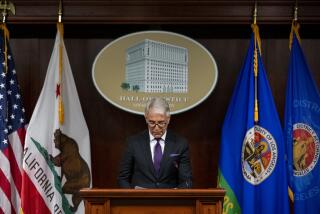The plot to get Gonzo
The Protect America Act of 2007, railroaded to enactment before a congressional recess, has been called many things: a measure “to give intelligence professionals the tools they urgently need to gather information about our enemies, while protecting the civil liberties of Americans” (President Bush), “flawed legislation” that violates the privacy of Americans (the the LA Times editorial board) and “another tendentiously titled federal law, in the tacky tradition of the USA Patriot Act, an abbreviation for Uniting and Strengthening America by Providing Appropriate Tools Required to Intercept and Obstruct Terrorism.” (me)
But there is another way to view this “quick fix” of the Foreign Surveillance Intelligence Act: as a bill of attainder against Alberto R. Gonzales.
Not a literal bill of attainder: a law penalizing someone without a trial. That would be unconstitutional (not that Congress doesn’t sometimes pass unconstitutional laws). Article I, Section 9; Clause 3 of the Constitution states: “No bill of attainder or ex post facto law shall be passed.” Gonzales is not mentioned by name in the Protect America Act, but the controversy about his credibility is reflected in the fact that the law says that “the director of national intelligence and the attorney general may for periods of up to one year authorize the acquisition of foreign intelligence information concerning persons reasonably believed to be outside the United States.”
An earlier proposal would have vested that authority solely in the attorney general, an idea that encountered resistance even from Republicans such as Sen. Arlen Specter of Pennsylvania. At a hearing on the firing of nine U.S. attorneys a purge for which Gonzales has taken responsibility even though he said he was out of the loop Specter said that making Gonzales the point man for surveillance “would be very difficult to do.”
No kidding. Gonzales’ credibility gap with Congress is the result not only of the U.S. attorney purge but also of Gonzales’ characterization of his infamous 2004 visit to the hospital room of his predecessor, John Ashcroft. Recall that Gonzales insisted to the Senate Judiciary Committee that a dispute within the Justice Department involved the legality not of President Bush’s Terrorist Surveillance Program (as the National Security Agency’s eavesdropping program came to be known) but of “other intelligence activities.”
After four Democratic senators called for the appointment of a special prosecutor to investigate Gonzales for perjury, the attorney general sent the committee a letter in which he said he was determined to address the impression that “my testimony was misleading.” He acknowledged that “the use of the term ‘Terrorist Surveillance Program’ and my shorthand reference to the ‘program’ publicly ‘described by the president’ may have created confusion, particularly for those knowledgeable about the NSA activities authorized in the presidential order described by the DNI, and who may be accustomed to thinking of them or referring to then as a single NSA ‘program.’ ”
A similar point was made in a letter that Specter received from Director of National Intelligence Mike McConnell that’s right, the official who shares authority over surveillance with Gonzales in the Protect America Act and who is more trusted by at least some members of Congress than the AWOL A.G. Citing McConnell’s letter, The Economist drolly concluded: “Perhaps the argument in the hospital room was over data mining rather than eavesdropping. And perhaps Mr. Gonzales is merely a weasel and not a perjurer.”
But an otherwise pliant Congress was reluctant to give even a weasel sole authority for authorizing the “acquisition of foreign intelligence information concerning persons reasonably believed to be outside the United States.” Contrast the new law with the old FISA, which provided that “the president, through the attorney general, may authorize electronic surveillance.”
The tweaking of the Protect America Act to limit the influence of Gonzales is remarkable for two reasons. Americans are taught that ours is a government of laws, not men; yet here is a law that trims the authority of an office that of the attorney general in response to concerns about a specific occupant of that office. What’s next? A revision of the Presidential Succession Act to move Gonzales to the end of the line, after the secretary of Veterans Affairs?
More startling than the writing of this law around Gonzales is the political reality that made such surgery necessary: Bush’s refusal to remove Gonzales. A president who happily dispatched Paul O’Neill and unhappily axed Donald Rumsfeld clings to his Texas crony even at the cost of changes in his battle plan for the “war on terror.” Isn’t that pre-9/11 thinking, Mr. President?
Michael McGough is The Times’ senior editorial writer. Send us your thoughts at [email protected].
More to Read
A cure for the common opinion
Get thought-provoking perspectives with our weekly newsletter.
You may occasionally receive promotional content from the Los Angeles Times.











